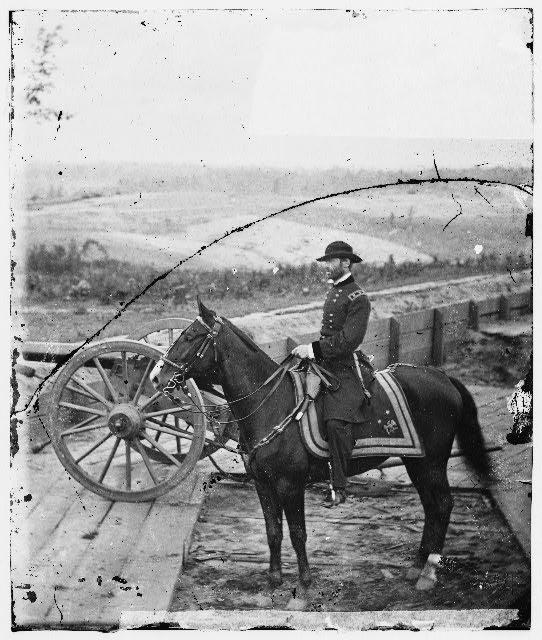Selling a Plan: In his memoirs Sherman recalls debate with Grant over the great march to the sea

With Atlanta secured, the residents evacuated, and his troops refreshed by a respite, Sherman was ready to turn the page and open a new chapter. During his occupation, the ambitious general evolved a plan to march sixty thousand troops across Georgia, destroying infrastructure, and on to the seaboard. But, as he recalls in his memoirs, this plan was not an easy sell. “Why will it not do,” Sherman telegraphed Grant, “to leave Tennessee to the forces which Thomas has, and the reserves soon to come to Nashville, and for me to destroy Atlanta and march across Georgia to Savannah or Charleston, breaking roads and doing irreparable damage? We cannot remain on the defensive.” (620)
Sitting at his headquarters at City Point, Virginia, Grant had his own problems. Frustrated that his campaign against Confederate General Robert E. Lee had come to siege around Petersburg, he also fretted about Thomas’s ability to effectively deal with Hood’s army. He made it clear that he would prefer Sherman to annihilate Hood. “With Hood’s army destroyed,” Grant telegraphed his red-haired subordinate, “you can go were you please with impunity.” His closing line must have frustrated is friend down in Georgia. “If you can see a chance of destroying Hood’s army, attend to that first, and make your other move secondary.” (639)
Growing impatient with his chief’s caution, Sherman shot back, “No single army can catch Hood, and I am convinced the best results will follow from our defeating Jeff. Davis’s cherished plan of making me leave Georgia by maneuvering.” (640) Before he could receive a reply from City Point, the impetuous commander pushed Grant to unleash him. “If I turn back,” Sherman argued, “the whole effect of my campaign will be lost.” Relief was not long in coming. “I do not see that you can withdraw from where you are to follow Hood, without giving up all we have gained in territory,” Grant telegraphed, “I say, then, go on as you propose.” (640-641)
Sherman’s need to fill pages of his memoir with the back-and-forth correspondence with Grant about the projected March to the Sea is interesting. He lays it all out and includes the whole of the correspondence, risking potential criticism for seemingly arguing with his superior. The rationale, however, is revealed. “This was the first time (referring to the telegram allowing him to “go on as you propose”) that General Grant ordered the “march to the sea,” Sherman wrote, “and, although many of his warm friends and admirers insist that he was the author and projector of that march, and that I simply executed his plans General Grant has never…thought so or said so.” (641) So as to drive home the point that he was indeed the father of the famous march, the Ohio general quoted a letter he later received from President Lincoln. “Now, the undertaking being a success,” the Commander in Chief wrote, “the honor is all yours; for I believe none of us went further than to acquiesce.” (641)
Looking back to his glory days from his comfortable perch as General in Chief, Sherman still was awed by his undertaking in Georgia. “It surely was a strange event – two hostile armies marching in opposite directions, each in the full belief that it was achieving a final and conclusive result in a great war,” the graying old warrior wrote, “I was strongly inspired with the feeling that the movement on our part was a direct attack upon the rebel army and the rebel capital at Richmond, though a full thousand miles of hostile country intervened, and that, for better or worse, it would end the war.” (644-645)
Check out Derek D. Maxfield’s new biography of William Tecumseh Sherman. Man of Fire: William Tecumseh Sherman in the Civil War is available from Savas Beatie.
Sorry, but how can the author even permit Sherman the emotion of “awe” over the success of what was essentially a glorified field trip. He had even more minimal opposition in Georgia than in his raid toward Meridien a year previously. Had Grant not been hamstrung by his jealousy toward and misreading of Thomas, he’d have adopted what I believe was the proper course for Sherman- a direct march to join Grant and crush Lee. As it was, Sherman’s burn and loot backdoor approach to Southside Petersburg actually gave fragments of Hood’s Army-destroyed by Thomas, of course- time to oppose him in North Carolina!
Well, can’t argue with the results. Grant had Lee immobilized at Petersburg, and Richmond threatened. The Union forces held much of the initiative in the West. “Sherman’s March” would make the war’s conclusion inevitable for all intents and purposes.
“destroying infrastructure”: an interesting euphemism for plundering and burning, with some rapes sprinkled along the way.
Tom
Sherman showed why he was put in command in the west. Strategic thinking and the initiative to act without being pushed by Washington. And he was successful. Which is why he’s attacked by fans of the less successful Union generals, and by fans of the confederacy.
Great points, Derek. I’ve also thought that correspondence is an interesting window into their command relationship.